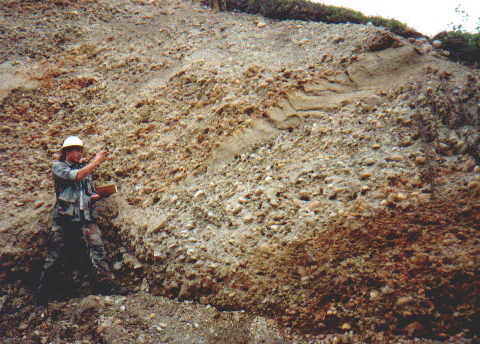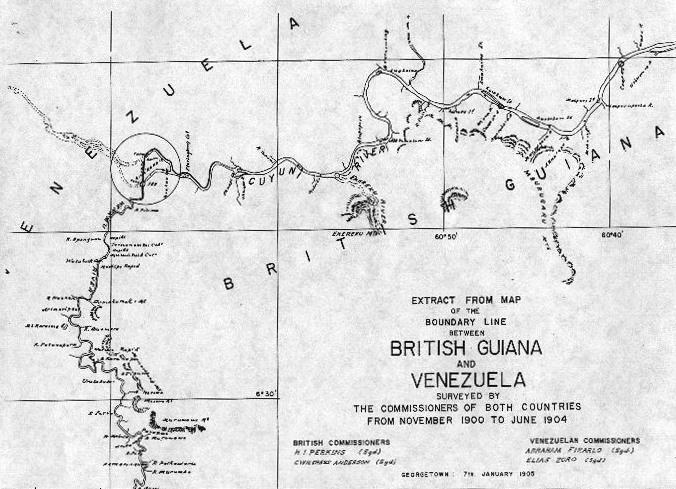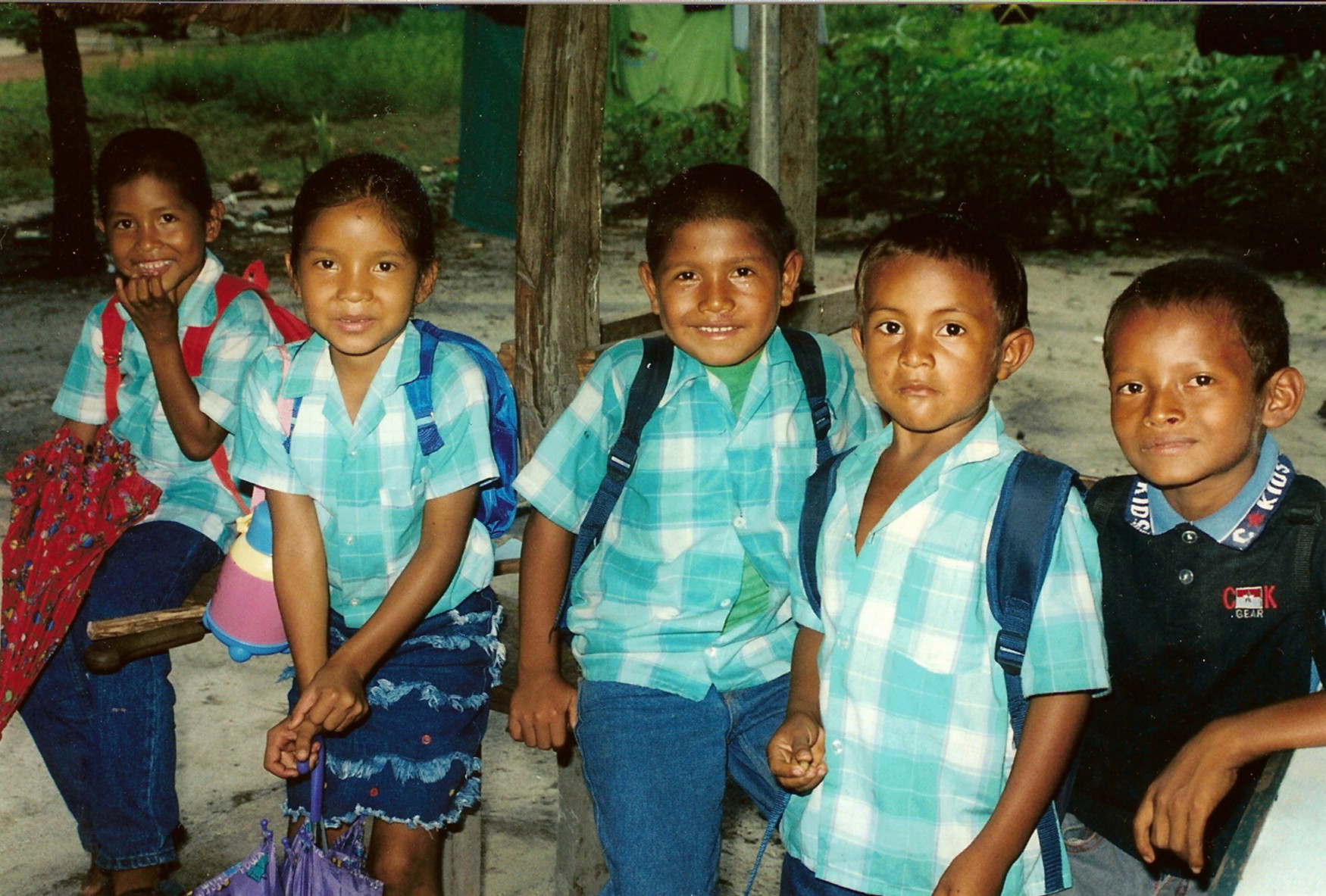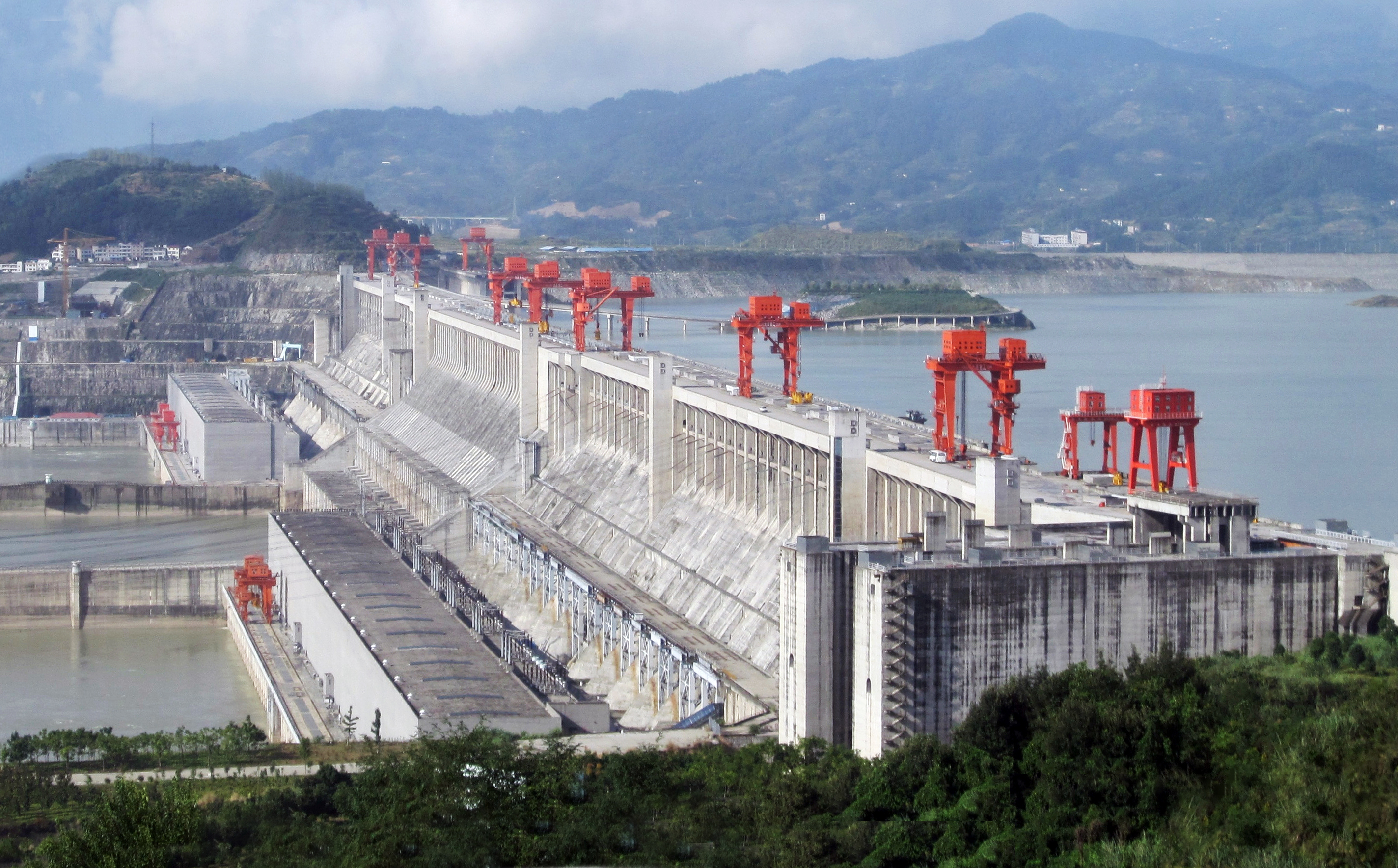|
Cuyuni River
The Cuyuni River is a South American river and a tributary of the Essequibo River. It rises in the Guiana Highlands of Venezuela, where it descends northward to El Dorado, and turns eastward to meander through the tropical rain forests of the Cuyuni-Mazaruni Region of Guyana. It finally turns southeastward, flowing to its confluence with the Mazaruni River. The Cuyuni River marks the limit of the disputed territory of Guyana Essequibo for approximately . Makarapan Mountain is a sandstone range by the Cuyuni. History In 1681, an island in the mouth of the Cuyuni River was cleared and planted with cassava for the use of the Dutch garrison. By 1694, a new plantation on the Cuyuni River above the fort was established. By 1703 a post was established on the Pariacot Savannah, in the upper Cuyuni. On January 2, 1895, the "Incident of the Cuyuni river", so named by the general , was an armed confrontation between Venezuelans and British in the region of the river over the territori ... [...More Info...] [...Related Items...] OR: [Wikipedia] [Google] [Baidu] |
Venezuela
Venezuela (; ), officially the Bolivarian Republic of Venezuela ( es, link=no, República Bolivariana de Venezuela), is a country on the northern coast of South America, consisting of a continental landmass and many islands and islets in the Caribbean Sea. It has a territorial extension of , and its population was estimated at 29 million in 2022. The capital and largest urban agglomeration is the city of Caracas. The continental territory is bordered on the north by the Caribbean Sea and the Atlantic Ocean, on the west by Colombia, Brazil on the south, Trinidad and Tobago to the north-east and on the east by Guyana. The Venezuelan government maintains a claim against Guyana to Guayana Esequiba. Venezuela is a federal presidential republic consisting of 23 states, the Capital District and federal dependencies covering Venezuela's offshore islands. Venezuela is among the most urbanized countries in Latin America; the vast majority of Venezuelans live in the cities of the n ... [...More Info...] [...Related Items...] OR: [Wikipedia] [Google] [Baidu] |
Alluvial
Alluvium (from Latin ''alluvius'', from ''alluere'' 'to wash against') is loose clay, silt, sand, or gravel that has been deposited by running water in a stream bed, on a floodplain, in an alluvial fan or beach, or in similar settings. Alluvium is also sometimes called alluvial deposit. Alluvium is typically geologically young and is not consolidated into solid rock. Sediments deposited underwater, in seas, estuaries, lakes, or ponds, are not described as alluvium. Floodplain alluvium can be highly fertile, and supported some of the earliest human civilizations. Definitions The present consensus is that "alluvium" refers to loose sediments of all types deposited by running water in floodplains or in alluvial fans or related landforms. However, the meaning of the term has varied considerably since it was first defined in the French dictionary of Antoine Furetière, posthumously published in 1690. Drawing upon concepts from Roman law, Furetière defined ''alluvion'' (the F ... [...More Info...] [...Related Items...] OR: [Wikipedia] [Google] [Baidu] |
International Rivers Of South America
International is an adjective (also used as a noun) meaning "between nations". International may also refer to: Music Albums * ''International'' (Kevin Michael album), 2011 * ''International'' (New Order album), 2002 * ''International'' (The Three Degrees album), 1975 *''International'', 2018 album by L'Algérino Songs * The Internationale, the left-wing anthem * "International" (Chase & Status song), 2014 * "International", by Adventures in Stereo from ''Monomania'', 2000 * "International", by Brass Construction from ''Renegades'', 1984 * "International", by Thomas Leer from ''The Scale of Ten'', 1985 * "International", by Kevin Michael from ''International'' (Kevin Michael album), 2011 * "International", by McGuinness Flint from ''McGuinness Flint'', 1970 * "International", by Orchestral Manoeuvres in the Dark from '' Dazzle Ships'', 1983 * "International (Serious)", by Estelle from '' All of Me'', 2012 Politics * Political international, any transnational organization of ... [...More Info...] [...Related Items...] OR: [Wikipedia] [Google] [Baidu] |
Essequibo Basin , also called Essequibo, Spanish name of a region administered and controlled by Guyana and regarded as part of its territory but also claimed by Venezuela
* Essequibo cricket team, a former first-class cricket team in Guyana
{{disambig, geo ...
Essequibo is the largest traditional region of Guyana but not an administrative region of Guyana today. It may also refer to: * Essequibo River, the largest river in Guyana * Essequibo (colony), a former Dutch colony in what is now Guyana; * Essequibo Islands-West Demerara, an administrative region of Guyana today * Guayana Esequiba (), sometimes also called or Essequibo, is a disputed territory of west of the Essequibo River that is administered and controlled by Guyana but claimed by Venezuela. [...More Info...] [...Related Items...] OR: [Wikipedia] [Google] [Baidu] |
History Of Guyana
The history of Guyana begins about 35,000 years ago with the arrival of humans coming from Eurasia. These migrants became the Carib and Arawak tribes, who met Alonso de Ojeda's first expedition from Spain in 1499 at the Essequibo River. In the ensuing colonial era, Guyana's government was defined by the successive policies of Spanish, French, Dutch, and British settlers. During the colonial period, Guyana's economy was focused on plantation agriculture, which initially depended on slave labor. Guyana saw major slave rebellions in 1763 and again in 1823. Great Britain passed the Slavery Abolition Act in British Parliament that abolished slavery in most British colonies, freeing more than 800,000 enslaved Africans in the Caribbean and South Africa as well as a small number in Canada. It received Royal Assent on August 28, 1833, and took effect on August 1, 1834. Thus, in the immediate period following this historical law, slavery was ended in British Guiana. To address the labor ... [...More Info...] [...Related Items...] OR: [Wikipedia] [Google] [Baidu] |
Rivers Of Venezuela
A river is a natural flowing watercourse, usually freshwater, flowing towards an ocean, sea, lake or another river. In some cases, a river flows into the ground and becomes dry at the end of its course without reaching another body of water. Small rivers can be referred to using names such as creek, brook, rivulet, and rill. There are no official definitions for the generic term river as applied to geographic features, although in some countries or communities a stream is defined by its size. Many names for small rivers are specific to geographic location; examples are "run" in some parts of the United States, "burn" in Scotland and northeast England, and "beck" in northern England. Sometimes a river is defined as being larger than a creek, but not always: the language is vague. Rivers are part of the water cycle. Water generally collects in a river from precipitation through a drainage basin from surface runoff and other sources such as groundwater recharge, springs, a ... [...More Info...] [...Related Items...] OR: [Wikipedia] [Google] [Baidu] |
Rivers Of Guyana
A river is a natural flowing watercourse, usually freshwater, flowing towards an ocean, sea, lake or another river. In some cases, a river flows into the ground and becomes dry at the end of its course without reaching another body of water. Small rivers can be referred to using names such as creek, brook, rivulet, and rill. There are no official definitions for the generic term river as applied to geographic features, although in some countries or communities a stream is defined by its size. Many names for small rivers are specific to geographic location; examples are "run" in some parts of the United States, "burn" in Scotland and northeast England, and "beck" in northern England. Sometimes a river is defined as being larger than a creek, but not always: the language is vague. Rivers are part of the water cycle. Water generally collects in a river from precipitation through a drainage basin from surface runoff and other sources such as groundwater recharge, springs, a ... [...More Info...] [...Related Items...] OR: [Wikipedia] [Google] [Baidu] |
Ankoko Island
Ankoko Island ('' es, Isla de Anacoco'') is an island located at the confluence of the Cuyuni River and Wenamu River, at , on the border between Venezuela and the disputed area of Guayana Esequiba. Venezuela, which claims Guayana Esequiba as part of its territory, established a military base on the island in 1966, which Guyana claims as intrusion and aggression on a territory whose sovereignty was never under discussion. History Venezuelan occupation In February 1966, the governments of Venezuela, the United Kingdom and Guyana signed the Geneva Agreement aimed at resolving the controversy over the Guayana Esequiba territorial dispute. Five months after Guyana's independence from the United Kingdom, Venezuelan troops began their occupation of Ankoko Island and surrounding islands in October 1966. Venezuelan troops quickly constructed military installations and an airstrip. Subsequently, on the morning of the 14 October 1966, Forbes Burnham, as Prime Minister and Minister ... [...More Info...] [...Related Items...] OR: [Wikipedia] [Google] [Baidu] |
Kali'na People
The Kalina, also known as the Caribs or mainland Caribs and by several other names, are an indigenous people native to the northern coastal areas of South America. Today, the Kalina live largely in villages on the rivers and coasts of Venezuela, Guyana, Suriname, French Guiana, and Brazil. They speak a Cariban language known as Carib. They may be related to the Island Caribs of the Caribbean, though their languages are unrelated. Name The exonym ''Caribe'' was first recorded by Christopher Columbus. One hypothesis for the origin of ''Carib'' is that it means "brave warrior". Its variants, including the English ''Carib'', were then adopted by other European languages. Early Spanish explorers and administrators used the terms ''Arawak'' and ''Caribs'' to distinguish the peoples of the Caribbean, with ''Carib'' reserved for indigenous groups that they considered hostile and ''Arawak'' for groups that they considered friendly. The Kalina call themselves ''Kalina'' or ''Karìna'' , ... [...More Info...] [...Related Items...] OR: [Wikipedia] [Google] [Baidu] |
Hydroelectric
Hydroelectricity, or hydroelectric power, is electricity generated from hydropower (water power). Hydropower supplies one sixth of the world's electricity, almost 4500 TWh in 2020, which is more than all other renewable sources combined and also more than nuclear power. Hydropower can provide large amounts of low-carbon electricity on demand, making it a key element for creating secure and clean electricity supply systems. A hydroelectric power station that has a dam and reservoir is a flexible source, since the amount of electricity produced can be increased or decreased in seconds or minutes in response to varying electricity demand. Once a hydroelectric complex is constructed, it produces no direct waste, and almost always emits considerably less greenhouse gas than fossil fuel-powered energy plants. [...More Info...] [...Related Items...] OR: [Wikipedia] [Google] [Baidu] |
Aurora Gold Mine
Guyana Goldfields was a Canadian company that owned and operated the Aurora gold mine in Guyana. Before being acquired by Zijin Mining in 2020, Guyana Goldfields was a publicly traded company with shares listed on the Toronto Stock Exchange and previously TSX Venture Exchange. Beginning in 1996 the company acquired exploration rights to the former Peters and Aurora mines with the objective of utilizing modern exploration technology to re-evaluate the potential gold reserves. Following positive exploratory results, the company received financing from the International Finance Corporation and other investors and conducted economic and technical feasibility studies. The Aurora gold mine began commercial production in 2015 and has produced approximately 125,000 to 160,000 ounces of gold per year from the mine since then. These lower than expected results and a revised technical study that significantly lowered the recoverable reserves estimates, led to the removal of the CEO and direc ... [...More Info...] [...Related Items...] OR: [Wikipedia] [Google] [Baidu] |
Illegal Mining
Illegal mining is mining activity that is undertaken without state permission, in particular in absence of land rights, mining licenses, and exploration or mineral transportation permits. Illegal mining can be a subsistence activity, as is the case with artisanal mining, or it can belong to large-scale organized crime, spearheaded by illegal mining syndicates. On an international level, approximately 80 percent of small-scale mining operations can be categorized as illegal. Despite strategic developments towards " responsible mining," even big companies can be involved in illegal mineral digging and extraction, if only on the financing side. Regional Issues Sub-Saharan Africa Spurred by widespread poverty and a lack of alternative income-earning opportunities, illegal artisanal mining is a well-documented phenomenon in sub-Saharan Africa. While legalization opportunities for artisanal and small scale mining are often available, inefficient government bureaucracy structures can m ... [...More Info...] [...Related Items...] OR: [Wikipedia] [Google] [Baidu] |








